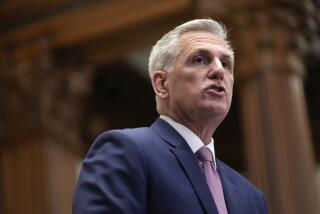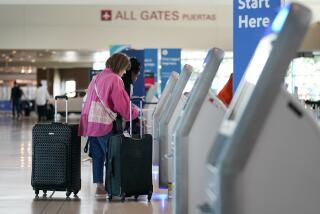HOUSE OF REPRESENTATIVES : Child Safety Seats on Airlines
- Share via
The House gutted an amendment requiring airlines to provide safety seats for children under age 2. The amendment would have resulted in parents having to buy a ticket for an infant. Under present policy, infants travel free if they are held, but a ticket must be bought if parents bring a safety seat aboard. This vote approved substitute language that essentially retains the existing policy. It occurred during consideration of an aviation bill (HR 2739) that remained in debate.
The underlying amendment for mandatory child-restraint seats was supported by the Assn. of Flight Attendants and the Air Transport Assn., the lobby for commercial airlines, and opposed by the Federal Aviation Administration.
James L. Oberstar (D-Minn.), who sponsored the substitute language, said requiring safety seats would prompt young couples to drive and face greater hazards on the road rather than fly.
Jolene Unsoeld (D-Wash.) said Congress should help infants “who are so helpless and are dependent upon us adults to make the decisions for them that are going to protect them. They should be as safe as the pop cans on the planes.”
The vote was 270 for and 155 against. A yes vote opposed the amendment in behalf of mandatory child-restraint seats on airlines.
How They Voted
Rep. Horn (R): Yea
Rep. Roybal-Allard (D): Nay
Rep. Royce (R): Yea
Rep. Torres (D): Yea
Rep. Tucker (D): Yea
Washington National Airport Traffic Study
The House refused to exempt Washington National Airport from a study of whether to permit more takeoffs and landings per hour. The vote occurred during debate on HR 2739 (above). It kept on track a proposed Transportation Department study of whether to allow increased traffic at four high-density airports: National, O’Hare in Chicago and Kennedy and La Guardia in New York.
Delegate Eleanor Holmes Norton (D-D.C.), who favored the exemption, said: “It is the big airlines who want this change. . . . If you vote (no) you will be seen by your constituents as voting for your own convenience . . . so that you can more easily come and go out of National Airport.”
William F. Clinger Jr. (R-Pa.), who wanted to keep National in the study, said the proposal was only a preliminary step, and that any resulting measure to increase commercial flights “would come before this body and be subject to a full debate at that time.”
The vote was 110 for and 294 against. A yes vote was to exempt Washington National Airport from the study.
How They Voted
Rep. Horn (R): Yea
Rep. Roybal-Allard (D): Yea
Rep. Royce (R): Nay
Rep. Torres (D): Nay
Rep. Tucker (D): Nay
Biological Survey on Private Lands
The House adopted an amendment concerning property rights that was offered to a bill (HR 1845) establishing a National Biological Survey. The survey would consist of Interior Department researchers, over several years, entering many private and public lands to take inventory of the nation’s animal and plant species and habitat. The proposed fiscal 1994 budget is $180 million.
The amendment requires the government to obtain a land owner’s permission in writing before entering private property to collect data. The bill remained in debate.
Supporter Bill Emerson (R-Mo.) said: “The purpose of this survey goes far beyond counting plants and animals” and could unleash “a militant eco-Gestapo force with little regard for the constitutional protections of private property ownership.”
Opponent Bruce F. Vento (D-Minn.) said: “This amendment is not about property rights. (It) is about putting hurdles in front of the National Biological Survey. This is not about science. This amendment is about political science and bringing politics into this.”
The vote was 309 for and 115 against. A yes vote supported the amendment.
How They Voted
Rep. Horn (R): Yea
Rep. Roybal-Allard (D): Nay
Rep. Royce (R): Yea
Rep. Torres (D): Nay
Rep. Tucker (D): Nay
Source: Roll Call Report Syndicate
More to Read
Get the L.A. Times Politics newsletter
Deeply reported insights into legislation, politics and policy from Sacramento, Washington and beyond. In your inbox three times per week.
You may occasionally receive promotional content from the Los Angeles Times.










